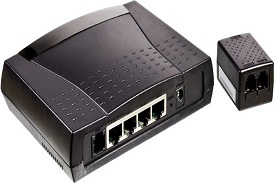
Digital Subscriber Line (DSL) equipment comprises a set of devices designed to enable high-speed internet access over existing telephone lines. Commonly used for broadband internet connections, DSL technology utilizes different types of equipment to transmit digital data at high frequencies while allowing voice calls to coexist on the same line. DSL equipment includes Customer Premises Equipment (CPE) such as DSL modems or routers, which connect to the user's computer and telephone line, as well as DSL Access Multiplexers (DSLAMs) located at the service provider's central office. DSL modems modulate and demodulate digital data for transmission over copper telephone lines, while DSLAMs aggregate and route these signals from multiple users to the internet or other networks. DSL technologies, including Asymmetric DSL (ADSL) and Very High Bitrate DSL (VDSL), offer varying data rates to accommodate different user needs. DSL equipment has played a crucial role in bringing broadband connectivity to homes and businesses, especially in areas where alternative high-speed options may be limited. However, as fibre-optic technologies continue to advance, DSL is gradually being replaced by faster and more efficient broadband solutions.
The Scheme GCS, Group B for Digital Subscriber Line (DSL) Equipment is essential in the telecommunications industry, particularly in broadband access networks. This scheme establishes standardized specifications for the design, functionality, and interoperability of DSL equipment, which is crucial for delivering high-speed internet access over existing copper telephone lines. Compliance with Group B ensures that DSL equipment consistently meets performance benchmarks, covering factors such as data transfer rates, signal quality, and compatibility with various DSL standards. DSL technology remains widely deployed for broadband internet access in both residential and business environments, and adherence to this scheme facilitates interoperability among different DSL equipment manufacturers, supporting a seamless and standardized broadband experience for end-users. The GCS Scheme, Group B, plays a pivotal role in advancing the efficiency, reliability, and compatibility of DSL equipment within the evolving landscape of broadband communication.
Note: Manufacturers of DSL Equipment are required to obtain the mandatory TEC Certification to sell their products in the Indian market.
For manufacturers intending to introduce DSL Equipment in the Indian market, strict adherence to TEC certification is not just advisable but an essential regulatory requirement. TEC certification is mandatory to ensure that DSL Equipment complies with specific technical standards and regulations set by the Telecommunication Engineering Centre, a pivotal authority in India responsible for formulating and enforcing technical norms for telecommunication equipment. This certification process is critical for validating the equipment's adherence to established criteria, covering aspects such as performance, network compatibility, and interoperability within the Indian telecommunication landscape. By obtaining TEC certification, manufacturers not only underscore their commitment to regulatory compliance but also demonstrate the reliability and compatibility of their DSL Equipment, ensuring seamless integration with the Indian communication network infrastructure.
The TEC Certification for DSL Equipment includes the following three variants:
TEC (Telecommunication Engineering Centre) Certification is a crucial accreditation granted by the Telecommunication Engineering Centre, which operates under the Department of Telecommunications, Government of India. TEC Certification ensures that telecommunications equipment complies with the specified technical standards and legal requirements, verifying their quality, safety, and interoperability. This certification is essential for manufacturers and importers seeking to market their telecommunications products in India. Established in 1987, TEC plays a vital role in formulating and enforcing standards to enhance the efficiency and reliability of telecommunication networks and services in the country. TEC Certification is a mark of adherence to these standards, facilitating market access and assuring consumers of the reliability and compliance of the certified products with Indian telecommunications norms.
Follow the given steps to complete your TEC certification process:
Step 1: Register on the TEC Portal
Step 2: Allotment of the testing laboratory
Step 3: Submit samples for testing
For more detailed information, please click here.
The list of documents required for TEC certification is as follows:
Legal Address Proof of the Manufacturing Unit:
Trademark Details:
Technical Details About Products:
For more detailed information, please click here.
Brand Liaison provides valuable support in obtaining the TEC Certificate for your products. Our services include:
For a more in-depth understanding of the documentation and procedures involved in obtaining TEC Certification, feel free to connect with our team of experts at +91-9250056788 or +91-8130856678.